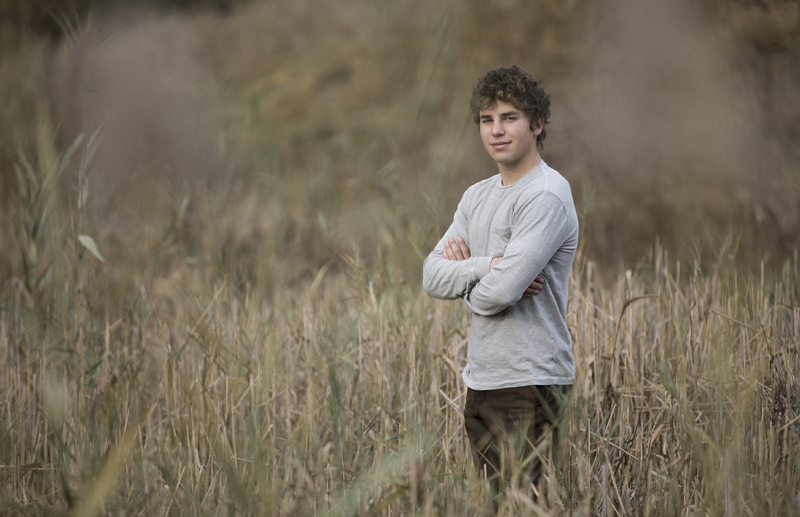Geology student wins Goldwater Scholarship
Jasper Baur's research focuses on plastic-landmine detection

Jasper Baur has already accomplished a great deal in his three years at Binghamton University: a presentation at the American Geophysical Union conference, a first-place finish in an international technology design competition and three published papers.
Baur can now add Goldwater scholar to his list of accolades.
The rising senior and geological sciences major is one of 496 U.S. college students to receive the prestigious Barry M. Goldwater Scholarship for the 2019-20 academic year. The scholarship — worth up $7,500 per year — goes to sophomores and juniors pursuing research in the natural sciences, mathematics and engineering. Baur, who was chosen from among 1,223 nominees, is also one of seven SUNY students to earn the 2019-20 honor.
“I appreciate the recognition and financial support of the scholarship,” Baur said. “Being a Goldwater scholar is one of the highest honors an undergraduate in STEM can receive, and it will help me a lot moving forward to graduate school and beyond.”
Baur believes that research experiences such as plastic-landmine detection while working with Binghamton University’s Geophysics Remote Sensing Laboratory enabled him to receive the Goldwater Scholarship.
“There are millions of [unexploded ordinance] worldwide that continue to cause thousands of fatalities and injuries a year,” Baur said. “Plastic landmines are very difficult to detect with conventional detection technologies. By using a thermal infrared camera attached to a drone, we can aerially detect plastic landmines based on heat differences between the mine and the surrounding environment.”
Baur’s journey into plastic landmines and unexploded ordinance began with a Freshman Research Immersion project in 2016. Baur and fellow student Will Frazer ’18 then turned their focus to FPM-1 landmines used in the Soviet-Afghan War.
In fall 2018, Baur and Frazer — with assistance from geology faculty members Alex Nikulin and Timothy de Smet — won first place in the international aerospace and defense category of the Create the Future technology design contest. Their remote landmine-detection research even defeated teams from NASA.
Baur called Frazer, Nikilun and de Smet “a significant part of my academic success.”
“All have been great mentors to me over the past three years,” Baur said.
Nikulin, an assistant professor of energy geophysics in the Geology Department, said Baur’s involvement in the FRI program laid the foundation for joining the Geophysics Remote Sensing Laboratory and setting him on the path to an academic career.
“Throughout his work in our lab, Jasper has demonstrated tremendous positive energy, dedication and attention to all details of the project,” Nikulin said. “Many students and faculty express surprise when they find out that Jasper [was] a junior, assuming that he is a graduate student based on the amount of time he spends in the lab on weekdays and weekends.
De Smet, a research assistant professor who directs the Geophysics Remote Sensing Laboratory, praised Baur’s energy and drive, noting that Baur remains committed to volunteer work and pursuing a love for painting.
“Jasper is smart, obviously, but so is every other student here at Binghamton University,” de Smet said. “It is his infectious enthusiasm and initiative that sets him apart. He takes ownership of projects, works hard and is unafraid to fail and then keep on working.”
Baur spent the spring semester studying at the University of Hawaii, taking courses in geologic field methods, petrology, remote sensing and painting. After graduation in 2020, he plans to pursue a doctorate in remote-sensing applications.
In the meantime, Baur will return for his senior year at Binghamton University not only as a Goldwater scholar, but as a researcher on a mission.
“Recognition for work is great, but the actual work itself is what matters,” he said. “By the end of next year, I plan to have a fully automated plastic-landmine detection system that can be used internationally in affected areas to help remedy the international landmine crisis.”

